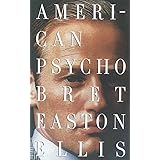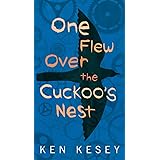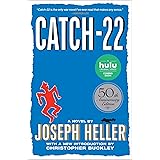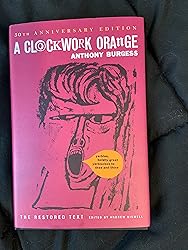
Enjoy fast, free delivery, exclusive deals, and award-winning movies & TV shows with Prime
Try Prime
and start saving today with fast, free delivery
Amazon Prime includes:
Fast, FREE Delivery is available to Prime members. To join, select "Try Amazon Prime and start saving today with Fast, FREE Delivery" below the Add to Cart button.
Amazon Prime members enjoy:- Cardmembers earn 5% Back at Amazon.com with a Prime Credit Card.
- Unlimited Free Two-Day Delivery
- Streaming of thousands of movies and TV shows with limited ads on Prime Video.
- A Kindle book to borrow for free each month - with no due dates
- Listen to over 2 million songs and hundreds of playlists
- Unlimited photo storage with anywhere access
Important: Your credit card will NOT be charged when you start your free trial or if you cancel during the trial period. If you're happy with Amazon Prime, do nothing. At the end of the free trial, your membership will automatically upgrade to a monthly membership.
Buy new:
-13% $13.95$13.95
Ships from: Amazon Sold by: The Perfect Book Store
Save with Used - Very Good
$6.50$6.50
Ships from: Amazon Sold by: Giant Giant

Download the free Kindle app and start reading Kindle books instantly on your smartphone, tablet, or computer - no Kindle device required.
Read instantly on your browser with Kindle for Web.
Using your mobile phone camera - scan the code below and download the Kindle app.

OK
Image Unavailable
Color:
-

-
-
- To view this video download Flash Player
 Audible sample Sample
Audible sample Sample 


A Clockwork Orange Paperback – April 17, 1995
Purchase options and add-ons
Great Music, it said, and Great Poetry would like quieten Modern Youth down and make Modern Youth more Civilized. Civilized my syphilised yarbles.
A vicious fifteen-year-old droog is the central character of this 1963 classic. In Anthony Burgess's nightmare vision of the future, where the criminals take over after dark, the story is told by the central character, Alex, who talks in a brutal invented slang that brilliantly renders his and his friends' social pathology. A Clockwork Orange is a frightening fable about good and evil, and the meaning of human freedom. When the state undertakes to reform Alex to "redeem" him, the novel asks, "At what cost?" This edition includes the controversial last chapter not published in the first edition and Burgess's introduction "A Clockwork Orange Resucked."- Print length213 pages
- LanguageEnglish
- PublisherW. W. Norton & Company
- Publication dateApril 17, 1995
- Dimensions5.5 x 0.6 x 8.3 inches
- ISBN-100393312836
- ISBN-13978-0393312836
- Lexile measure1310L
"Layla" by Colleen Hoover for $7.19
From #1 New York Times bestselling author Colleen Hoover comes a novel that explores life after tragedy and the enduring spirit of love. | Learn more
Frequently bought together

Similar items that may deliver to you quickly
 They have turned you into something other than a human being. You have no power of choice any longer. You are committed to socially acceptable acts, a little machine capable only of good.Highlighted by 570 Kindle readers
They have turned you into something other than a human being. You have no power of choice any longer. You are committed to socially acceptable acts, a little machine capable only of good.Highlighted by 570 Kindle readers What does God want? Does God want woodness or the choice of goodness? Is a man who chooses the bad perhaps in some way better than a man who has the good imposed upon him?Highlighted by 526 Kindle readers
What does God want? Does God want woodness or the choice of goodness? Is a man who chooses the bad perhaps in some way better than a man who has the good imposed upon him?Highlighted by 526 Kindle readers ‘But the essential intention is the real sin. A man who cannot choose ceases to be a man.’Highlighted by 385 Kindle readers
‘But the essential intention is the real sin. A man who cannot choose ceases to be a man.’Highlighted by 385 Kindle readers
Editorial Reviews
Review
― New York Times
"Looks like a nasty little shocker, but is really that rare thing in English letters: a philosophical novel."
― Time
"I do not know of any other writer who has done as much with language as Mr. Burgess has done here ― the fact that this is also a very funny book may pass unnoticed."
― William S. Burroughs
"A terrifying and marvelous book."
― Roald Dahl
About the Author
Product details
- Publisher : W. W. Norton & Company (April 17, 1995)
- Language : English
- Paperback : 213 pages
- ISBN-10 : 0393312836
- ISBN-13 : 978-0393312836
- Lexile measure : 1310L
- Item Weight : 7.1 ounces
- Dimensions : 5.5 x 0.6 x 8.3 inches
- Best Sellers Rank: #342,472 in Books (See Top 100 in Books)
- #3,342 in Psychological Fiction (Books)
- #9,303 in Classic Literature & Fiction
- #19,147 in Literary Fiction (Books)
- Customer Reviews:
About the author

Anthony Burgess (1917-1993) was a novelist, poet, playwright, composer, linguist, translator and critic. He is best known for his novel A Clockwork Orange (1962), but altogether he wrote thirty-three novels, twenty-five works of non-fiction, two volumes of autobiography, three symphonies, more than 250 other musical works, and thousands of essays, articles and reviews.
Burgess was born in Manchester, England and grew up in Harpurhey and Moss Side. He was educated at Xaverian College and Manchester University. He lived in Malaya, Malta, Monaco, Italy and the United States, among other places. His books are still widely read all over the world.
Customer reviews
Customer Reviews, including Product Star Ratings help customers to learn more about the product and decide whether it is the right product for them.
To calculate the overall star rating and percentage breakdown by star, we don’t use a simple average. Instead, our system considers things like how recent a review is and if the reviewer bought the item on Amazon. It also analyzed reviews to verify trustworthiness.
Learn more how customers reviews work on AmazonReviews with images
-
Top reviews
Top reviews from the United States
There was a problem filtering reviews right now. Please try again later.
Little Alex. Little Alex has a proper mum and pop, lives in a proper flat, in a proper block, all good. But it's not enough for little Alex. Little Alex likes to perform a bit of ultra-violence every night with his droogs, but it's just simple bloodletting, oh no. It's more sophisticated than that. Alex has wit, Alex is fond of classical music, Alex adds the disturbing twist to his crimes, and that, only at 15. He does everything there is to try, the beating, the cutting, the raping, the stealing, until one day he stumbles on killing, and that's a slippery slope that leads him to an institution where some very interesting new curing methods are tried on him, and lo and behold, I can't tell you no more as otherwise I will spoil it for you, in case you happened to have been untouched by this story, wether in book or film shape. Anyway. It all turns around, of course, as things do in life. Those who do crimes, pay for their crimes, but who is to judge what is fair? How much do you pay, and when can we stop the punishment? I know there have been horsed of scholars who said smart things about this book and about life and people at large and how it relates, but on my level I can tell you that the coin has always two sides, and we may forever wonder if what the author was trying to say, but I have a feeling that is wasn't simple glorifying of sex and violence, as it might seem. Oh no. It's about "Why?", and about "Why not?" Why do we have violence and those who enjoy it? Because those who do it can tell you, why not? When we're blind as to why we shouldn't, we do it just because we can, don't we? We do until we get caught. That's how we learn. Some earlier, some later. Alex does learn, eventually, but at a cost. Okay, I need to shut up now otherwise this will turn into an essay. Go read it. It will, literally, blow your mind.
To be honest, I've never been much interested in the fortuitous, ultra-violent concept behind Kubrick's film (which I had never seen before finishing the book this week), but decided to give the book a shot after learning about its intricate linguistic complexities, by incidentally reading the 'Translator's Notice' in the most recent Brazilian translation (Fabio Fernandes for publisher Aleph). There, Fernandes enthusiastically go over each of the main devices used by Burgess to create a sense of strangeness in the dystopic future of ACWO and how he as a translator dealt with them: the Russian-derived words in nadsat ('horrorshow'/хорошо for excellent, 'rot'/рот for mouth, 'rooker'/руки for hands, 'litso'/лицо for face, 'malenky'/маленький for little or tiny, 'devotchka'/девочка for girl, 'veshch'/вещь for thing and so on), the childish rhyming slang (like kids talking cute in words like 'skoliwoll', 'gutiwutis', 'eggiweg') and the pompous sort-of-shakespearean discourse (filled with thus's, thou's and thine's). All of that made me start reading the Brazilian translation in Portuguese and the original English version simulteaneously. But soon I felt comfortable moving on only with the original, having a nadsat glossary at hand just not to lose track of anything.
Actually, as soon as I made it through the surf of the nadsat, just like in Joyce's *Ulysses* (and Burgess as a linguist was a devoted Joycian), ACWO turned into a very entertaining journey because it is so fast-paced. However, the comparison with Joyce's can't go much beyond the surface of the linguistic mimicking, because Burgess himself admitted in life that he wrote ACWO in a hurry (scholars now say he wrote the book in 18 months, but Burgess himself used to brag he did it in just three weeks because he needed the money). Actually, all Nadsat, the childish rhyming slang and the sort-of-shakesperean discourse seemed to me to be rather gross stylistic shortcuts, like finding a solution to create this sense of strangeness of the dystopic future quickly (it certainly makes it easier to establish that all Nadsat comes from anglicized Russian, but why would it be that way?--was there a time when England was under Russian command?). The same can be said about Alex's pompous Shakespearean tone--it is cool, but it is there just because it is cool, no matter how hard it is to explain in the context of the novel why is that.
Differently from the Kubrick's film, 'Your Humble Narrator' Alex is, at the beginning of the novel, only a 15-year-old violent teenager who actually comes from a (presumably) stable family--which maybe could help explain how he had the chance to know so much about classical music and develop his devotion to "Ludwig van", although all references to classical music in the novel seem to be, as Nadsat and Shakespeare, stylistic shortcuts as well. In any event, Alex's story goes on for more or less three years, and that is what makes the whole difference with Kubrick's movie (and indeed caused Burgess himself to depricate it), as clearly Malcolm McDowell was not only much older (isn't that something that happens with all adaptations of Hamlet to the screen as well?) but also out-of-placedly immature.
I must confess I was completely 'nagoy' about the controversy surrounding the last, 21st chapter. All I can say is that, at first, it really came to me as a blatantly sarcastic detour. It was like the book was moving in one direction and all of sudden it moved almost 180 degrees around. Until the end, I was eagerly waiting for a plot twist that would put it back on track, but that was a hope slowly vanished as the unread pages diminished. So all I had as a console was the prison's chaplain's phrase: if Alex couldn't choose, he wouldn't be free, so he had to learn by himself what goodness was really all about. It is a sort of naïve idea that maybe was needed in the 1960s when Burgess wrote the book, but an idea that didn't age well. That is not what you could say about the rest of the book, which not only didn't age, it became so fluid with our own reality that it has, sadly enough, fallen almost into our everyday triviality.
Top reviews from other countries
The story centres on Alex DeLarge, his gang of ‘droogs’, and his ultra violent ways. Told entirely in the first person, it is the autobiography of ‘our humble friend and narrator’ Alex as he ‘tolchocks lewdies’, destroys literature, gets involved in ‘bitvas’ or battles with other gangs, and ‘viddies’ opportunities to ‘crast’ (steal) and tolchock ‘malchicks and devotchkas’ (men and women) in their domy (home).
It is split into three parts - the first part is about the aforementioned nature of Alex’s ultra violence, and deathly consequences of that as he becomes a young offender. It also highlights the relationship with his parents (his “em and pee”) and their complete apathy towards his upbringing, and his interactions with his Post-Corrective Advisor, P.R. Deltoid, who wants to save the young Alex from himself, and from the bars of a nasty prison cell, and, in particular, to save his own reputation, which is on the line, as an advisor in the process. We also see Alex’s insidious sexual crimes here as well.
The second part is much more about Alex’s time in the Bailey, and the relations he has with the Prison Charlie as he longs to get the new Ludovico treatment rumoured to be employed by Minister of the Interior, that helps prisoners get out of prison earlier, but at a cost to their mental freedom, which proves to be a treatment very unpopular with the staff there.
The third and final part deals with the release of Alex from prison, the effects of the Ludivico treatment on not only his freedom to choose, but also on his ability to feel and to dream. We see the ramifications of his liberation conflated with his mental prison and how his parents replaced him with a lodger, his victims become his aggressors, and through the first person perspective, how the book is driving us to see Alex as a victim of the modern age. It then deals with how Alex’s wrongful treatment has sent the government on a crash course to overcorrect the issue as they medically reverse his conditioning from the treatment he received in prison to bring the young man back to his original self as the government recovers from haemorrhaging votes. But the book then eventually focuses on how Alex’s own sensibilities as a young man may have been shaped almost entirely by a lack of control in his adolescence, leading to the controversial ending that US publishers changed in the book’s export to the states, which has significantly been immortalised by the Stanley Kubrick film.
The book is much more about the dystopian future than Kubrick’s film, although the themes of that future are definitely shared between the two products. The idea of youth culture and gang warfare as a vicious cycle undercuts Burgess’ narrative, whilst the Kubrick film is much more about how Alex has little to no control over anything to the point where he is emotionally deprived of his love of music, the only thing to give him real pleasure. I love how the book goes into extra details about other composers Alex loves as a ‘sophisto’ such as J.S. Bach and Mozart (in particular his compositions ‘The Jupiter’ and ‘40’).
The use of Beethoven is kept from book to film, and I recognise that it was the more important plot device for showing the truly disturbing nature of being forced to endure torture at the heart of the very thing you love (which is in the book, but a different piece of music is used in that scenario). “Being impelled towards bad while also being impelled towards good”.
The world of violence that is described lyrically within ‘the real horrowshow’ linguistics of the book helps make it all feel like one big jigsaw puzzle that the reader puts together of the reality we could face at some points. Its themes may have been explored tenfold in the Kubrick film, but it is amazing how many ideas, and scenarios already existed in Burgess’ own text.
Despite the author’s own reservations about the book, in particular with its legacy dominated by Kubrick’s adaptation, it is clear that Burgess intended to write a short but impactful story with this one, and it certainly won’t appeal to everyone, but I would recommend giving it a chance to shine, and for other readers to viddy if it can hit them in the guttiwugs the same way our humble friend and narrator does so to many chellovecks and devotchkas throughout the plot.
Zur Kindle-Version:
Ich finde die Kindle-Version ok, aber nicht perfekt. Es ist toll, dass es Seitenzahlen gibt, das ist leider nicht immer so. Was mir fehlt, sind die Angaben zu der besonderen Wortwahl des Protagonisten. Wörter wie 'slovo', 'bratchnies', 'vonny', 'viddy' usw. werden nicht angegeben. Und leider sind diese besonderen Wörter, die der Protagonist benutzt, ein Merkmal des Buches, sie kommen in fast jedem Satz vor. Das ist ein absolutes Minus.
Zum Inhalt:
Ich werde nicht spoilern, sondern nur kurz etwas allgemein zum Inhalt sagen. Grob gesagt, dreht es sich um einen jungen 14jährigen Kriminellen, der raubt, schlägt und mordet. Nachdem er gefasst wird, soll eine neuartige Umerziehung an ihm durchgeführt werden. Erzählt wird die Geschichte aus der Ich-Perspektive, also aus Sicht des Kriminellen.
Die Geschichte ist sehr brutal, aber dennoch lesenswert. Man bekommt einen Einblick in die Gefühlswelt des Protagonisten, die absolut schonungslos ehrlich ist.
Zur Sprache:
Das Buch bedient sich einer sehr besonderen Sprache. Der Protagonist bedient sich eines Slangs, der durch seine besondere Wortwahl gekennzeichnet ist. Viele Substantive kommen aus dem slawischen Sprachbereich (z.B. 'moloko', 'slovo' usw.) aber auch aus dem Deutschen (z.B. 'Kartoffel' oder 'von' werden benutzt). Ich habe ein Bild als Textbeispiel angefügt. Als Nicht-Muttersprachler ist das sehr gewöhnungsbedürftig. Dennoch versteht man komischerweise worum es geht. Man kann sich die Bedeutung viele Wörter mit Hilfe des Kontextes erschließen. Dennoch sollte man schon recht gute Englischkenntnisse besitzen, sonst sollte man es nicht im Original lesen. Einfaches Schulenglisch reicht eher nicht, denke ich.
Vielleicht hilft das ja als Orientierung.
Vielen Dank für das Lesen meiner Rezension. Ich hoffe, sie ist hilfreich. :)
Reviewed in Germany on May 20, 2023
Zur Kindle-Version:
Ich finde die Kindle-Version ok, aber nicht perfekt. Es ist toll, dass es Seitenzahlen gibt, das ist leider nicht immer so. Was mir fehlt, sind die Angaben zu der besonderen Wortwahl des Protagonisten. Wörter wie 'slovo', 'bratchnies', 'vonny', 'viddy' usw. werden nicht angegeben. Und leider sind diese besonderen Wörter, die der Protagonist benutzt, ein Merkmal des Buches, sie kommen in fast jedem Satz vor. Das ist ein absolutes Minus.
Zum Inhalt:
Ich werde nicht spoilern, sondern nur kurz etwas allgemein zum Inhalt sagen. Grob gesagt, dreht es sich um einen jungen 14jährigen Kriminellen, der raubt, schlägt und mordet. Nachdem er gefasst wird, soll eine neuartige Umerziehung an ihm durchgeführt werden. Erzählt wird die Geschichte aus der Ich-Perspektive, also aus Sicht des Kriminellen.
Die Geschichte ist sehr brutal, aber dennoch lesenswert. Man bekommt einen Einblick in die Gefühlswelt des Protagonisten, die absolut schonungslos ehrlich ist.
Zur Sprache:
Das Buch bedient sich einer sehr besonderen Sprache. Der Protagonist bedient sich eines Slangs, der durch seine besondere Wortwahl gekennzeichnet ist. Viele Substantive kommen aus dem slawischen Sprachbereich (z.B. 'moloko', 'slovo' usw.) aber auch aus dem Deutschen (z.B. 'Kartoffel' oder 'von' werden benutzt). Ich habe ein Bild als Textbeispiel angefügt. Als Nicht-Muttersprachler ist das sehr gewöhnungsbedürftig. Dennoch versteht man komischerweise worum es geht. Man kann sich die Bedeutung viele Wörter mit Hilfe des Kontextes erschließen. Dennoch sollte man schon recht gute Englischkenntnisse besitzen, sonst sollte man es nicht im Original lesen. Einfaches Schulenglisch reicht eher nicht, denke ich.
Vielleicht hilft das ja als Orientierung.
Vielen Dank für das Lesen meiner Rezension. Ich hoffe, sie ist hilfreich. :)





























